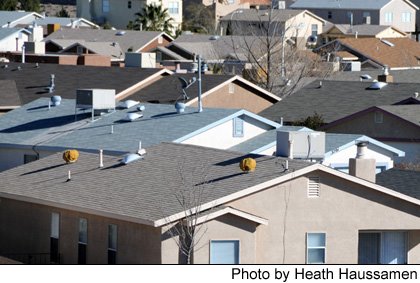In a new report, woman who revealed housing authority problems to the public takes issue with Balderas’ audits of the system
The woman who first blew the whistle on the scandal in New Mexico’s housing authority system says the state auditor’s reports on the matter are seriously flawed, not going far enough to reveal what she calls “the fundamental corruption that goes down to the very base of our public entities.”
Las Crucen Frances Williams, in a document she authored at the request of two state senators, writes that State Auditor Hector Balderas’ special audits of the affordable housing system are “confusing, contradictory, inconsistent, inconclusive and misleading.” The document has been circulating among lawmakers and others.
It was Williams, complaining to newspaper reporters and others in 2006, who first revealed the problems in the system to the public. At the time, she was a board member of the Las Cruces-based Region VII authority.
Some of Williams’ complaints in the new report appear relatively minor. For example, Williams writes that her “first clue about the quality of the audit” of Region VII was the fact that it does not contain a full list of its board members, including her. The state auditor’s lack of knowledge about who was on the board likely hampered investigation, she charges, because some of those commissioners might have been able to provide relevant information.
Other issues raised in the report are potentially more serious. Williams writes that the audit does not raise or investigate certain conflict-of-interest allegations involving people tied to the housing authorities.
“While these are allegations, it would seem appropriate for the state auditor, who was entrusted by the legislature to audit and investigate the housing mess in
Balderas, in a two-page response to Williams’ report, defended the audits as revealing “severe mismanagement of public funds and abuse of the public trust.” His response noted, as did his office’s special audits, that missing documentation was a huge stumbling block to completing the audits.
“The OSA (Office of the State Auditor) respects Ms. Williams’ viewpoints regarding the OSA’s audits and welcomes the opportunity to work with her to address her concerns,” Balderas’ statement reads. “We believe the audits make a significant contribution to understanding the true financial condition of
‘Nothing was happening’
In spite of the missing documentation, the sum of the special audits was that, whether it was due to corruption, ineptitude, mismanagement or other factors, the housing authorities were running amok with public money and there were inadequate controls in place to stop it. Balderas has said his audits prove that the authorities had become “a colossal failure to low-income citizens and the state of
Most of the state housing authority system collapsed in 2006 when the Albuquerque-based Region III Housing Authority defaulted on $5 million in bonds it owed the state. Soon thereafter, the State Investment Council released a report that found widespread misuse of the bond money, which was supposed to be spent on houses. In January, the state auditor released his office’s long-awaited reports.
Attorney General Gary King’s office has said it is investigating, but King delayed a plan to take the case before a grand jury last month. Sen. Mary Kay Papen, D-Las Cruces, and others have expressed concern about the investigation’s slow pace.
It was Papen and Senate Finance Chairman John Arthur Smith, D-Deming, who requested that Williams author the response to the Balderas audits. Williams has gathered a great deal of documentation on the scandal and been interviewed by investigators from more than one state agency.
Papen said in an interview that her goal is to continue to shine light on the issue.
“Nothing was happening. I know the attorney general says he’s working on it, and I think he is, but I don’t think it’s a priority, personally,” Papen said.
Papen said she believes Balderas “did a fairly decent job with what he had to work with,” but she believes the auditor was hampered because documents were destroyed — which is a felony crime.
Balderas has been unwilling to speculate on why documentation can’t be located beyond saying it was either destroyed, taken or not maintained in the first place. His audits are among the information being considered as part of the AG probe.
‘What the hell are we going to do about it?’
Williams said in an interview she’s upset that the primary finding in the audits is that documentation is missing. That’s why she complained to Papen and Smith, and that’s why she agreed to write the report. Her goal, she said, was to expose “the fundamental corruption that goes down to the very base of our public entities.”
“Just look at what happened,” Williams said.
The bond money was supposed to be spent on houses. Instead, almost $600,000 went to former Region III Director Vincent “Smiley” Gallegos as salary and benefits. In addition, Region III loaned almost $700,000 to Region VII, which did little to provide affordable housing and, like Region III, has since shut down.
Perhaps the most intriguing misuse of money revealed in the investment council report was a $300,000 loan Region III made to a private company owned by Gallegos under the guise of purchasing more than 30 lots in
Among the new findings in Balderas’ audits, which were requested and funded by the Legislature, was the revelation that Region III was taking out mortgages on homes it already purchased with bond money. That was done to increase cash on hand, but also significantly increased the debt.
Williams said that while the housing scandal itself is egregious, the lack of action is equally outrageous.
“I don’t know what else to do, but I’m very frustrated that I’ve been yelling about this since 2004 and, so far, no one’s been doing anything about it,” Williams said. “… I mean, I can write the story, but what the hell are we going to do about it?”

